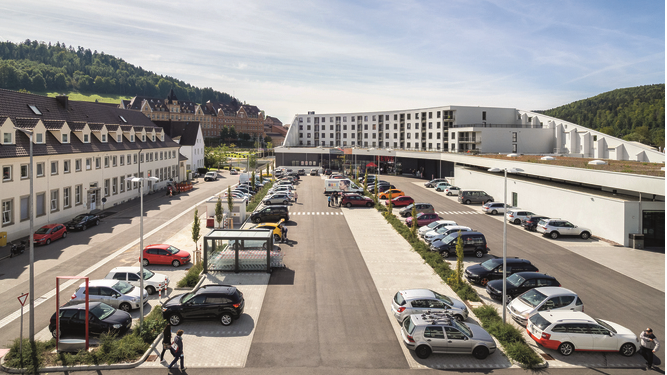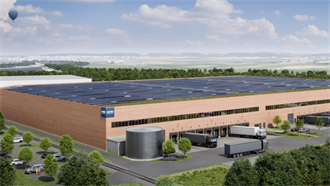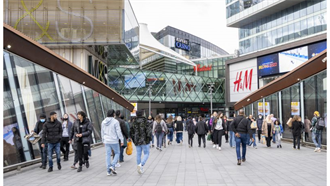The success of supermarkets during the pandemic has been well documented, with grocery store yields continuing to compress throughout 2021 and attracting an increasingly diverse set of investors.
However, some of the most notable names in the space have been shopping for supermarkets a little longer, and their extensive experience is paying off as competition tightens to acquire grocery-led assets across Europe.
Supermarket Income REIT, the UK focused fund advised by Atrato Capital, posted a NAV return of 12.8% in its full year results to 30 June after its portfolio value rose 8.5%. Managing director Steven Noble credits a smart acquisitions strategy as much as active asset management, while the market’s positive momentum also helps.
‘One of the good things about the supermarket sector is that you don’t tend to have the same level of active management that you have in other sectors, with the cadence of tenant turn or void,’ Noble says.
‘You tend to have long full repairing and insuring (FRI) leases,’ he notes. However, there are ways to add value. ‘Opportunities include adding solar panels to buildings and selling power back to the operators, installing drive through restaurants, or repurposing space on the site.’
When it comes to beating the competition to strike deals, he adds: ‘Exploiting our credibility as buyers, we are able to source off-market opportunities, which is key. However, assets are still widely available.
'There were a lot of open-ended funds that acquired supermarket sale-and-leasebacks 10 years ago, and some of them have now shut down. Others were hit with heavy redemption requests, so grocery store sales offer liquidity. Elsewhere, investors are stepping away from retail altogether and don’t differentiate between grocery assets and other types when they divest.
‘From our perspective, you really need to be a sector specialist because not all supermarkets are the same. You need to underwrite the investment at a store level – how it trades, how it fits within its local area, all of which is driven by demographics and branding.
'If you get that wrong, there are some cases where supermarkets are just not good investments. When you get it right, they are fantastic. We have former Sainsbury’s CEO Justin King on board as a senior adviser so we understand the sector inside out.’
The store as warehouse
Another part of what makes supermarkets so attractive at the moment is their place in the omnichannel story, Noble notes. ‘From the beginning we thought that omnichannel sales would grow significantly. This of course was accelerated by the pandemic. But this doesn’t cut out stores, far from it. In the UK, 80% of online sales are now fulfilled through stores – with 25% click and collect and the rest home delivery.’
In fact, according to Noble, the store has become the preferred model of fulfilling online deliveries – as opposed to warehouses – for many supermarket operators, due to a range of factors.
‘Why use stores and not centralised distribution networks? Well, the challenge with grocery logistics is that three temperature zones are required; you have to hit specific delivery times and you have 30-40 different items that need to be delivered in a single order. That is drastically different to, say, a standard Amazon order, where delivery times can be optimised and parcels can be left for hours. One warehouse can cover an entire region in these cases.
'For groceries, it’s a completely different story, and supermarkets fill this spot in the supply chain perfectly: they already have the correct cool zones, they are in strategic locations for their customers, and essentially make fantastic last mile assets.’
He adds: ‘That’s why we predominately seek to acquire stores which also fulfil omnichannel sales; growth in this area is bound to come. Just look at Amazon’s acquisition of Whole Foods and their Amazon Fresh roll out: they see that stores are essential for online delivery, as Bezos quipped, using centralised distribution they ‘have thrown away more bananas than they have ever sold’.’
Asda and Morrisons deals
The year 2021 has been distinguished in the UK by two high profile takeovers involving Asda and Morrisons. While private equity players are clearly attracted to the inherent real estate, Noble isn’t sure that a wholesale supermarket property sell-off from either is on the cards.
‘That’s because the cost of debt is relatively low compared to the cost of leasing right now,’ he notes. ‘Grocery operators can currently borrow at 2-3%: Asda has managed this with its bond issue and other debt forays in the capital markets.’ Indeed, the supermarket operator is currently exploring further debt raising options after an attempt to sell off its forecourt gas pumps fell through.
‘All that means these groups don’t need to pursue supermarket sale and leasebacks. Owning the freehold and packaging that up as security for banks is much cheaper than pursuing sale-and-leaseback financing. Sale-and-leasebacks used to go off balance sheet but that’s not the case anymore, so we’re not expecting to see a lot of their stores flood the market.’
Grocery sales continue to climb
In the meantime – apart from brief interruptions due to the petrol crisis in the UK – consumers’ baskets have largely continued to expand, according to Atrato figures.
‘A lot of people thought sales post-pandemic would go back to normal but they didn’t. There are more people working from home, spending less money on coffee and sandwiches at Pret and more in the weekly shopping basket. That increased level of home working is an enormous opportunity for the grocery sector, and we don’t expect that to change. For online grocery in particular it’s an enormous driver of growth.’
To date, Supermarket Income REIT has only made modest forays into discount grocery stores, although Noble underlines it is due to structural issues, rather than disliking their business model. ‘The discount operators love freehold, they don’t really do leasehold, so few sale-and-leasebacks have emerged. Those stores also tend not to have a long trading record, so when you buy them, you are taking a bet on future trading.
'They tend to be smaller sites, so if they don’t trade well, it’s easy for the occupier to up and leave. We do have three in the portfolio now which did have strong trading history – we are quite picky. Overall, the discounters have a really great model and it’s actually a format which has been present in the UK for decades, contrary to the impressions of many – think of the likes of Kwik Save and Iceland. The German discounters only arrived in the 1990s.’
Tech and the future of supermarkets
Omnichannel aside, the supermarket business has surprising, further affinities with a digital-first future. Amazon’s till-less stores set an exciting precedent for what can be done, Noble muses. ‘Grocery is a boring space, but innovations like cashless tills and self-service tills are early moves to full till-less stores, if you can get the trolley tech to work. It will be key to the profitability fundamentals going forward.
'Other developments include predictable algorithms around stock management to improve the service proposition; hand-held computers for online orders; plus back-of-house robotics to streamline omnichannel fulfilment. Tesco is piloting robots across 25 stores which take items out of the grid and move them somewhere to make picking more efficient.’
Greenman and the German route
Dublin-headquartered Greenman Investments is another high-profile player in the grocery store acquisition space, with a strategy focused on the purchase, operation and sale of German retail centres.
But as Johnnie Wilkinson, Greenman’s CEO and director, underlines, Germany is a very different market to the UK and neighbouring France. For that reason, the firm is also exploring further geographical diversification.
‘While during the pandemic, German consumers shopped more frequently but with much bigger basket sizes, those have now declined again to almost the same shopping patterns as pre-Covid,’ Wilkinson notes. ‘But there have been significant changes at an operator level. We have seen German grocers become much more interested in engaging in different distribution formats. Aldi has improved internal data systems so there can be more clarity on how many products are in store at any time and exactly what they are.
And that’s because during the pandemic, during the shift to click-and-collect, many grocers simply didn’t have enough information about what was in their stores. Aldi has now invested huge sums to create this data stream and has also launched Aldi eCommerce as a business line, in a sure sign it is going down this route. And if one grocer offers this, the other three market players will have to follow.
‘Another interesting evolution is that the use of credit and debit cards surged during the pandemic, which was always seen as a limiting factor in Germany’s rates of e-commerce penetration – they simply weren’t used that much before. So, I think we’re going to see Germany very quickly catching up with the UK and France in this respect.’
Next stop: France
Before the pandemic hit European shores, Greenman was already planning to expand its business to France, potentially through the acquisition of a local asset manager. ‘That didn’t work out, so we set up our own entity there, appointed a staff of five, and since this summer we’ve been building our acquisitions pipeline,’ Wilkinson explains. ‘We are pursuing a similar sale and leaseback strategy in France as we did in Germany.
'Retailers tend to own a lot of their property in France and many are now interested in freeing up capital to service debt and provide cash to fund operations. We’re already starting to see interest in this approach from some of the private equity players as they attempt to enter the market, which highlights the attractiveness of our approach.
‘The balance sheet of Casino in France is overweight with debt so they will have to do something, while some of the French supermarket groups are selling off their real estate in Poland. Kaufland also has a significant store portfolio in Romania and Poland which it may seek to divest.’
Omnichannel potential
One of the hallmarks of Greenman’s German strategy has been acquiring a mix of small city centre convenience stores and larger rural properties. ‘We currently think that some of the city centre properties are more at risk, due to competition from the likes of Gorillas or Uber Eats. But the rural sites have their own risks, due to de-population trends. However, where planning protections are good, we continue to like out-of-town stores for their distribution potential and are also interested in buying adjacent petrol stations, because we see opportunities for things like electrical charging. We are already partnering with Tesla on some of our sites.
‘We started investing in cash-and-carry assets a few years ago and have noticed they are used as small delivery hubs for local orders, which makes them very interesting.’
In the interests of diversifying investor income from the fund, Greenman is planning to generate 5% of investor income from non-rental sources by 2025. Projects linked to this target include vertical farms, renewable energy and data services. ‘The vertical farms strategy is a natural extension of our ESG strategy and our commitment to having a carbon neutral portfolio by 2040.’ Wilkinson notes.
‘We currently have small in-house farm units provided by an associated Greenman business called Potager in some of our Kaufland stores, the tech for which has been sourced through IGS, our partner in Scotland, which is a leader in creating small-scale growing towers. They are nine metres high and have 20 different levels, each of which can be set at different temperatures and moisture levels. Overall, very little water is used – we can harvest run-off rainwater to maintain them. As sealed units, they require no pesticides, so we don’t need to wash the produce and the shelf life is longer. We are very keen to be involved in this story as local supply-chains evolve.’
Greenman has proved quite tech-forward in recent years, with its investment in Irish drone start-up Manna a key example. ‘Manna is about exploring how distribution might change in the future,’ Wilkinson explains. ‘Its business model targets deliveries from existing grocery stores, as well as partnering with delivery apps. They’re currently fulfilling 100 deliveries a day from Tesco supermarkets across two cities in Ireland: order to receipt is about five minutes. That changes how people shop: it means they can buy bacon and eggs in the morning, sweets for their kids in the afternoon, an onion in the evening.
‘It’s not really efficient at the moment, but its ‘just in time’ delivery credentials are exciting. Particularly in a moment where road and truck deliveries are under pressure, we think drone delivery has a lot of potential. We’re working on rolling out a pilot programme in Germany next year, so watch this space.’




































